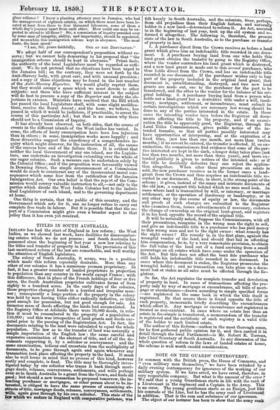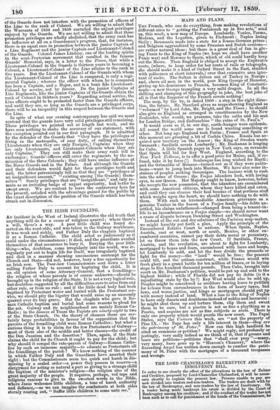NOTE ON THE GUARDS' CONTROVERSY.
1st common with the British press, the House of Commons, and "even military men themselves," we have been rebuked by a daily evening contemporary for ignorance of the working of our military system. If we have erred, we have erred, therefore, in very respectable company. But what is the amount of the error ? We said that a young Guardsman starts in life with the rank of a Lieutenant in the regiment and a Captain in the Army. This is an error. The young gentleman starts as an Ensign, just like his comrade of the Line, but he has the army rank of Lieutenant in addition. That is the sum and substance of our ignorance. The object of our lecturer has been to show that the army rank
of the Guards does not interfere with the promotion of officers of the Line to the rank of Colonel. We are willing to admit that
the Warrants of 1854 and 1858 curtailed the unjust privileges enjoyed by the Guards. We are not willing to admit that those promotion privileges are wholly abolished, that the army rank has no influence at all on a Guardsman's progress, that, for instance, there is an equal race in promotion between the junior Captain of a Line Regiment and the junior Captain and Lieutenant-Colonel of the Guards. Colonel James Lindsay, one of the leadinc,° spirits in the semi-Prretorian movement that resulted in the famous Guards' Memorial, says, in a letter to the Times, that while a Lieutenant-Colonel in the Guards is thirteen years in becoming a Colonel, a Lieutenant-Colonel of the Line attains to the rank in five years. But the Lieutenant-Colonel of the Guards with whom the lieutenant-Colonel of the Line is compared, is only a regi- mental Captain ; whereas the officer with whom he is compared has been a Captain, and a Major, and is a bone. fide Lieutenant- Colonel by service not by favour. Do the junior Captains of Line Regiments, like the junior Captains of the Guards obtain the rank of Colonel in thirteen years ? Regarding actual service, the Line officers ought to be promoted faster than the Guards officers, and until they are, so long as the Guards are a privileged corps, there will be an inequality in this respect between the Guards and the Line.
In spite of what our evening contemporary has said we must contend that the guards have very solid privileges still remaining. Those privileges we pointed out at length last week, and we have seen nothing to shake the accuracy of our statement, with the exception pointed out in our first paragraph. It is admitted by the defender of the Guards that "they have the privileges of living in the metropolis, of easy duty, of calling themselves [Lieutenants when they are only Ensigns,] Captains when they are only Lieutenants, and Lieutenant-Colonels when they are only Captains." They can still make their army rank tell in exchanges ; Guards'-officers still enter the regiments by the no- mination of the three Colonels ; they still have undue influence at the Horse Guards and in the Palace. And although the Guards and their defenders would fight for these privileges tooth and nail, the latter patronisingly tell us that they are "privileges of an insignificant amount," existing among [the Guards] them- selves"! ! Surely privileges that are insignificant," and only re- main as an irritating badge of unjust superiority, had better be swept away. We are content to leave the controversy here for the present, satisfied with the advantage gained for the public by the exact description of the position of the Guards which has been struck out in discussion.



































 Previous page
Previous page